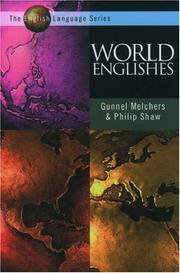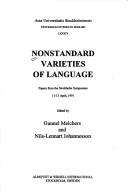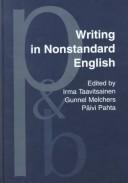| Listing 1 - 10 of 17 | << page >> |
Sort by
|
Dissertation
Year: 1972 Publisher: Stockholm : Stockholm University,
Abstract | Keywords | Export | Availability | Bookmark
 Loading...
Loading...Choose an application
- Reference Manager
- EndNote
- RefWorks (Direct export to RefWorks)

ISBN: 0340718889 0340718897 0340718870 9780340718896 Year: 2003 Publisher: London Arnold
Abstract | Keywords | Export | Availability | Bookmark
 Loading...
Loading...Choose an application
- Reference Manager
- EndNote
- RefWorks (Direct export to RefWorks)
Sociolinguistics --- Historical linguistics --- English language --- Dialectology --- Music sound recording --- Engelse taal --- taalsituatie en taalpolitiek --- varianten --- Engelse taal. --- taalsituatie en taalpolitiek. --- varianten. --- Taalsituatie en taalpolitiek. --- Varianten. --- Dialectologie --- Historische taalkunde --- Sociolinguïstiek --- Engelse taalkunde --- ANGLAIS (LANGUE) --- VARIATION --- PAYS DE LANGUE ANGLAISE --- A L'ETRANGER --- COMMONWEALTH
Book
ISBN: 9781444135374 Year: 2011 Publisher: London Hodder Education
Abstract | Keywords | Export | Availability | Bookmark
 Loading...
Loading...Choose an application
- Reference Manager
- EndNote
- RefWorks (Direct export to RefWorks)

ISBN: 912201635X 9789122016359 Year: 1994 Volume: 84 Publisher: Stockholm: Almqvist och Wiksell,
Abstract | Keywords | Export | Availability | Bookmark
 Loading...
Loading...Choose an application
- Reference Manager
- EndNote
- RefWorks (Direct export to RefWorks)
Language and languages --- English language --- Sociolinguistics --- Variation --- Congresses. --- Foreign languages --- Languages --- Anthropology --- Communication --- Ethnology --- Information theory --- Meaning (Psychology) --- Philology --- Linguistics --- Germanic languages --- Variation&delete& --- Congresses --- Language and culture --- Sociology --- Integrational linguistics (Oxford school) --- Language and languages - Variation - Congresses --- English language - Variation - Congresses. --- Sociolinguistics - Congresses.

ISBN: 9027250820 9789027250827 1556199457 9781556199455 9789027299031 902729903X 9786612163234 6612163232 128216323X 9781282163232 Year: 1999 Publisher: Amsterdam Benjamins
Abstract | Keywords | Export | Availability | Bookmark
 Loading...
Loading...Choose an application
- Reference Manager
- EndNote
- RefWorks (Direct export to RefWorks)
This text investigates linguistic variation as a complex continuum of language use, from standard to non-standard. It acknowledges the mutually defining relationship that oppositional concepts have, and offers a multifaceted, multidisciplinary approach to non-standard writing.
Pragmatics --- English language --- Dialectology --- Dialect literature, English --- Dialect literature, American --- Language and culture --- English Literature --- English --- Languages & Literatures --- Germanic languages --- Culture and language --- Culture --- American dialect literature --- American literature --- English dialect literature --- English literature --- History and criticism --- Variation --- Dialects --- History and criticism. --- Variation. --- Dialects.
Digital
Year: 2019 Publisher: Abingdon Routledge
Abstract | Keywords | Export | Availability | Bookmark
 Loading...
Loading...Choose an application
- Reference Manager
- EndNote
- RefWorks (Direct export to RefWorks)
Book
ISBN: 9789176350058 9789176350072 9789176350065 Year: 2015 Publisher: London : Stockholm University Press,
Abstract | Keywords | Export | Availability | Bookmark
 Loading...
Loading...Choose an application
- Reference Manager
- EndNote
- RefWorks (Direct export to RefWorks)
Why is the Isle of Dogs in the Thames called Isle of Dogs? Did King Canute’s men bring English usage back to Jutland? How can we find out where English speakers suck their breath in to give a short response? And what did the Brontës do about dialect and think about foreign languages? The answers are in this collection of empirical work on English past and present in honour of Nils-Lennart Johannesson, Professor of English Language at Stockholm University. The first five chapters report individual studies forming an overview of current issues in the study of Old and Middle English phonology, lexis and syntax. The next six look at Early Modern and Modern English from a historical point of view, using data from corpora, manuscript archives, and fiction. Two more look at the Old English scholar JRR Tolkien and his work. The remaining chapters discuss aspects of Modern English. Several use corpora to look at English usage in itself or in relation to Swedish, French, or Norwegian. The last three look at grammatical models, the pragmatics of second language use, and modern English semantics.
Book
ISBN: 9176350045 9176350053 9176350061 Year: 2015 Publisher: Stockholm Stockholm University Press
Abstract | Keywords | Export | Availability | Bookmark
 Loading...
Loading...Choose an application
- Reference Manager
- EndNote
- RefWorks (Direct export to RefWorks)
Book

ISBN: 9783110208399 Year: 2008 Publisher: Berlin Boston
Abstract | Keywords | Export | Availability | Bookmark
 Loading...
Loading...Choose an application
- Reference Manager
- EndNote
- RefWorks (Direct export to RefWorks)
Digital

ISBN: 9783110208399 9783110196351 Year: 2008 Publisher: Berlin ;; Boston De Gruyter Mouton
Abstract | Keywords | Export | Availability | Bookmark
 Loading...
Loading...Choose an application
- Reference Manager
- EndNote
- RefWorks (Direct export to RefWorks)
| Listing 1 - 10 of 17 | << page >> |
Sort by
|

 Search
Search Feedback
Feedback About UniCat
About UniCat  Help
Help News
News